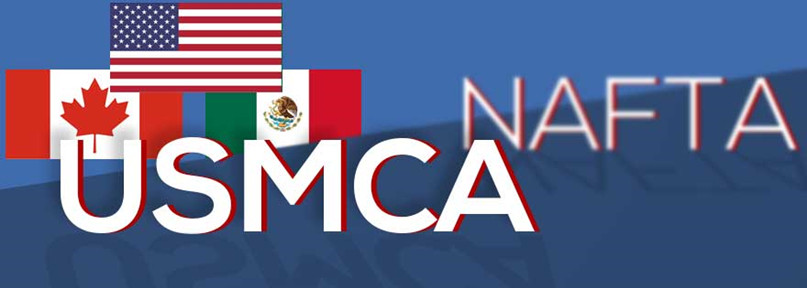Create Time 2018-10-05 05:10 Views:23499

On October 1, 2018, the Government of Canada announced agreement with a new trade agreement called the United States-Mexico-Canada Agreement (USMCA). The USMCA will replace the North America Free Trade Agreement (NAFTA) and will reinforce the strong economic relationship between the three member countries. The USMCA with its 34 chapters and 12 side letters covers a broad range of topics including those related to agriculture, automotive trade, dispute resolution and e-commerce. Among its implications, the USMCA opens Canada's dairy market to the United States, incentivizes greater automotive production in North America and adds more intellectual property protections. The agreement provides key outcomes for businesses operating in the three member countries.
This article focuses on the impact of the USMCA on the Canadian trademark and copyright law landscape.
Chapter 20 of the USMCA covers intellectual property rights and is 63 pages long - this chapter is notably more detailed than the existing intellectual property chapter in NAFTA. The chapter builds on current international intellectual property agreements and includes statements of policy, objectives, and best practices. The text largely reflects current Canadian intellectual property law with the following likely being the greatest significance in Canadian trademark law and copyright law:
an extension on the term of copyright protection with the copyright term to last 70 years following the life of the author (Canada currently provides 50 years following the life of the author);
the addition of pre-established damages for trademark counterfeiting; and
the strengthening of border enforcement in relation to intellectual property rights.
Notably, one of the most significant changes stemming from the USMCA will be an increase on the length of copyright protection by 20 years. This change will provide consistency with respect the term of copyright protection across Canada, the United States and the European Union. In Canada, the current basic term of copyright protection is the life of the author plus 50 years. The USMCA will require for that term to increase to the life of the author plus 70 years. Canada will have 2.5 years to implement this copyright term extension.
The USMCA also contemplates providing "safe harbors" to limit the liability of internet service providers (ISPs) and enables Canada to maintain its "notice-and-notice" regime. The safe harbors will protect ISPs from liability for copyright infringements that "they do not control,initiate or direct, and that take place through systems or networks". However, in order for ISPs to have the benefit of safe harbor protection, they will have to comply with a set of requirements including "expeditiously remov[ing] or disabl[ing] access to material residing on their networks or systems" if circumstances of infringement is apparent.
Other than the above noted changes, it appears that Canadian copyright law is largely already in compliance with the USMCA.
The USMCA requires that Canada ratify or accede to the Madrid Protocol and adopt a trademark classification system consistent with the Nice Classification system, established by the Nice Agreement. Canada is already largely in compliance with these and other provisions of the USMCA relating to trademark law given the upcoming amendments to Trade-marks Act anticipated to occur early in 2019. For instance, though the USMCA mandates that scent and sound marks be eligible for registration, Canada already allows registration of sound marks and the upcoming amendments to the Trade-marks Act expand the definition of trademarks to include scents and tastes.
In relation to trademark counterfeiting, Article 20.J.4.6 of USMCA provides that Canada must establish or maintain a system that provides for "pre-established damages" or "additional damages" (which may include exemplary or punitive damages) in civil judicial proceedings. Such pre-established damages must be "in an amount sufficient to constitute a deterrent to future infringements and to compensate fully the right holder for the harm caused by the infringement." Notably, this is of great benefit to brand owners as implementing statutory damages for trademark counterfeiting will strengthen their ability to protect their marks and increase the value of their mark.
Geographical Indications
The USMCA provides several new safeguards relating to the protection or recognition of geographical indications (GI). These provisions outline administrative procedures designed to limit availability of GIs where legitimate objections are raised and include grounds of denial, opposition, and cancellation, and guidelines for determining whether a term is deemed generic.
Border Enforcement Measures
The USMCA provides rules for civil, criminal and border enforcement of intellectual property rights. The current law provides limited measures for in-transit goods and importantly such goods may not be detained. With the USMCA, however, customs officials will be given considerably more border enforcement authority against "suspected counterfeit trademark goods". For example, customs officials will be permitted to inspect, detain and destroy suspected counterfeit trademark goods (confusingly similar to registered trademark goods) following a determination that the goods are infringing. Where such determination flows from "a procedure by which competent authorities may determine within a reasonable period of time after the initiation of the procedures whether the suspect goods infringe an intellectual property right." Notably, such determination does not require court proceedings.
Conclusion
While Canada, the United States and Mexico have agreement on the USMCA in principle, it must still be ratified in each of the USMCA member countries before it can take effect. Accordingly, the full implications and impact of the USMCA remains to be seen. Nevertheless, with the intellectual property provisions provided in the USMCA, it appears that trademark and copyright protections will be strengthened and the value of such rights increased. To learn about how you can register your trademark in Canada, connect with us and our trademark experts will be happy to help.
Disclaimer: This website is not intended to offer legal advice or to be a substitute for a consultation on a case by case basis with an attorney. The information provided above is meant for informational purposes only and may be subject to change.
2019 Witmart, Inc. All Rights